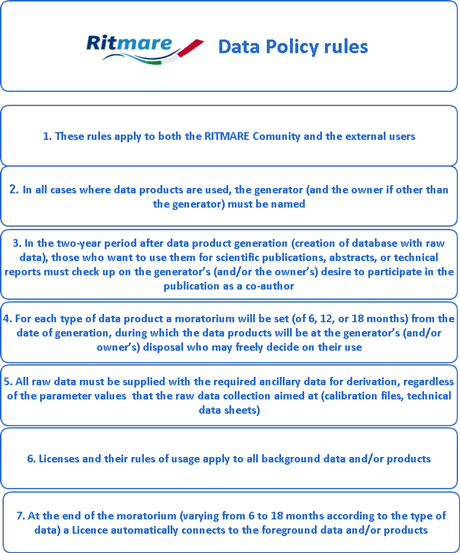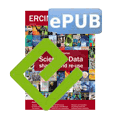by Anna Basoni, Stefano Menegon and Alessandro Sarretta
A thorough understanding of marine and ocean phenomena calls for synergic multidisciplinary data provision. Unfortunately, much scientific data is still kept in drawers, and in many cases scientists and stakeholders are unaware of its existence. At the same time, researchers lament the time consuming nature of data collection and delivery. To overcome barriers to data access, the RITMARE project issued a data policy document, an agreement among participants on how to share the data and products either generated by the project activities or derived from previous activities, with the aim of recognizing the effort involved.
The RITMARE Flagship Project is one of the National Research Programs funded by the Italian Ministry for Education, University and Research, coordinated by the National Research Council (CNR) and involving the whole Italian marine research community. The project’s main goal is the interdisciplinary integration of national marine research.
The objective of the RITMARE Data Policy (RDP) is to define common rules on how to access, use and share the information provided by the project for an improved understanding of the marine environment.
The RDP was formulated taking into account:
- the international scientific community, which strongly encourages the rapid sharing of information;
- the European Union which, in numerous directives, has clearly stated that free access to data and products generated by public funds is the only way to go [1];
- the Italian Digital Agenda, which is gradually formulating rules to govern open access [2].
Briefly, in accordance with several initiatives within the marine scientific context, the RDP tries to reach a trade-off between two conflicting needs: (i) the demand for easy and open access to data, and (ii) the requirements of data generators to see their work recognized and to have sufficient time to communicate their results and hypotheses.
The RDP does not apply to sensitive data, which is subject to agreements with protection and security institutions. Some other exemptions (potentially sensitive data for socio-economic reasons) can be evaluated by the RDP Governance Board. These rules represent the maximum level of data constraint accepted within the RITMARE project. Researchers, however, are encouraged to attribute less restrictive norms. In fact, even though licences that restrict the re-use of data to non-commercial purposes (e.g., the Creative Commons license CC-BY-NC) were accepted, the RDP recommends the use of less binding licences (e.g., CC-BY).

Figure 1: RITMARE Data Policy rules.
The highlights of the RDP are summarized in Figure 1, which illustrates the seven mandatory rules for the project. The first rule defines the involved parties: the entire RITMARE marine research community, both internal and external to the project. The second rule states that each user shall name the data generator; the third rule requires that everyone interested in publishing the data in scientific publications, abstracts and technical reports, within the first two years from data creation, should verify the willingness of the data generator to participate as co-author. The fourth rule establishes the moratorium period: this could last from six to 18 months, depending on the data or product typology, during which period the generator has primary publication rights. After the moratorium period, a standard open licence has to be associated with the data, depending on the data type. To enable this automatic mechanism of licence attribution, a classification of data and products is provided by the generators (see seventh rule). Furthermore, to derive the correct data from the raw data, the fifth rule states that ancillary information should be available, containing, for example, the calibration file and instrument specifications.
The above rules refer to foreground data. For background data, the relevant licences or rules should be applied (see sixth rule). A data policy tool is available by means of which the appropriate licence will be assigned to each data/product. Every research group (generator) must fill in the table with the following data (metadata):
- owner of/responsible for each data/ product
- name of data/product
- short description
- period of moratorium (in months)
- type of licence
- additional notes.
The RDP application contributes effectively to the full integration of the Italian marine scientific community through the transfer and sharing of data and knowledge in order to improve the quality of research produced, its visibility and its international competitiveness. Through integration with the other activities of the project, the RDP will help to make RITMARE a demonstrator of the importance of open access to information - not only in scientific research, but also to innovation and general quality of life.
The latest version of the document is now available on the Figshare repository [3], licensed under a Creative Commons Attribution 4.0.
Acknowledgement:
The activities described in this paper have been funded by the Italian Flagship Project RITMARE. The authors wish to thank Paola Carrara, Raffaele d'Adamo, Giuseppe Manzella, Gianfranco Pazienza, Anna Rampini and Maurizio Ribera d’Alcalà for their contribution and support.
Links:
RITMARE Flagship Project: http://www.ritmare.it
Open definition: http://opendefinition.org/
http://creativecommons.org/licenses/
http://www.dati.gov.it/iodl/2.0/
http://opendatacommons.org/licenses/odbl/
http://creativecommons.org/licenses/
References:
[1] European Commission: 2013/37/UE Directive of the European Parliament and of the Council of 26 June 2013 amending Directive 2003/98/EC on the re-use of public sector information, 2013.
[2] Italian Law Decree n. 81/2013, in particular Art. 4.
[3] SP7_WP3, RITMARE Data Policy, http://figshare.com/articles/RITMARE_Data_Policy_document/1235546
Please contact:
Anna Basoni, IREA-CNR, Italy
E-mail:
Stefano Menegon, Alessandro Sarretta
ISMAR-CNR, Italy
E-mail: Stefano.Menegon|Alessandro











